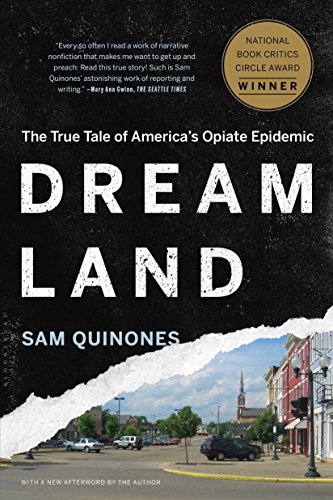Common Book Tackles Tough Topic of Opioid Addiction
Posted Oct 26, 2020
Otterbein University’s Common Book is taking on the complex issue of the opioid epidemic through an interdisciplinary lens. This shared reading experience will challenge students to look at all angles of the epidemic throughout the academic year.
This year’s Common Book, “Dreamland: The True Tale of America’s Opiate Epidemic” by journalist and author Sam Quinones, uses the blue-collar city of Portsmouth, Ohio, as an entry point to examine the opioid epidemic, which has devastated hundreds of small towns and cities across the country. He weaves together stories of Big Pharma, narcotics investigators, survivors, and more into an examination of the causes and repercussions of an unprecedented epidemic of addiction in America.

“The Common Book Committee looks for an engaging, dynamic, contemporary book with an author who is willing and able to participate in a campus visit. We look to share stories across genres and for there to be a variety of topics over the time of a student’s tenure on campus,” said Colette Masterson, co-chair of the Common Book Committee and director of the Center for Student Involvement.
Quinones will come to campus this week for classroom visits and a campus-wide lecture. The lecture was livestreamed on Tuesday, Oct. 27, via the University’s YouTube channel. The recording is now available for replay..
“Having the author come to campus truly brings the book to life and allows students to learn about the writing process, the author’s vision, and to dig deeper into the book’s messages,” said Masterson.
In addition to the annual lecture, the Department of Theatre and Dance takes an artistic approach to examining the themes of the Common Book with a presentation of scenes and interpretations from the book.
TJ Gerckens, chair of the Department of Theatre and Dance, thinks theatre is a good lens to examine contemporary issues. “Theatre is an engine of empathy. It allows us to experience things from another’s point of view in a very personal, emotional way. Tapping this engine of empathy gives us a window into the world of the opioid addict, allows us to see it in a more personal light and makes it more real and understandable to each of us,” he said.
“Contemporary issues like addiction can seem like things that happen to ‘others,’ to someone else, but theatre allows us, sometimes forces us, to experience and feel it in a new way,” he added.
According to Gerckens, this project gives first-year theatre students a direct look into the theatre industry. “As first-year students, each with their own specialty and frame of reference, they are thrust into the role of theatre makers. They need to think outside of their individual disciplines to interpret a text, vector that interpretation out of the context of the Common Book itself, determine how to collaborate with a group of fellow classmates, and meet the unrelenting deadline of a theatrical ‘Opening Night.’”
The Common Book program was established in 1995 thanks to the generosity of Mary B. Thomas, a graduate of the Class of 1928, to add an academic component to new student orientation and to welcome incoming students to an intellectual community willing to grapple with significant issues.
Learn more about the Common Book program and past books and authors at https://www.otterbein.edu/csi/common-book/. See the reading list for the next Common Book at https://otterbein.libguides.com/CommonBookOU.